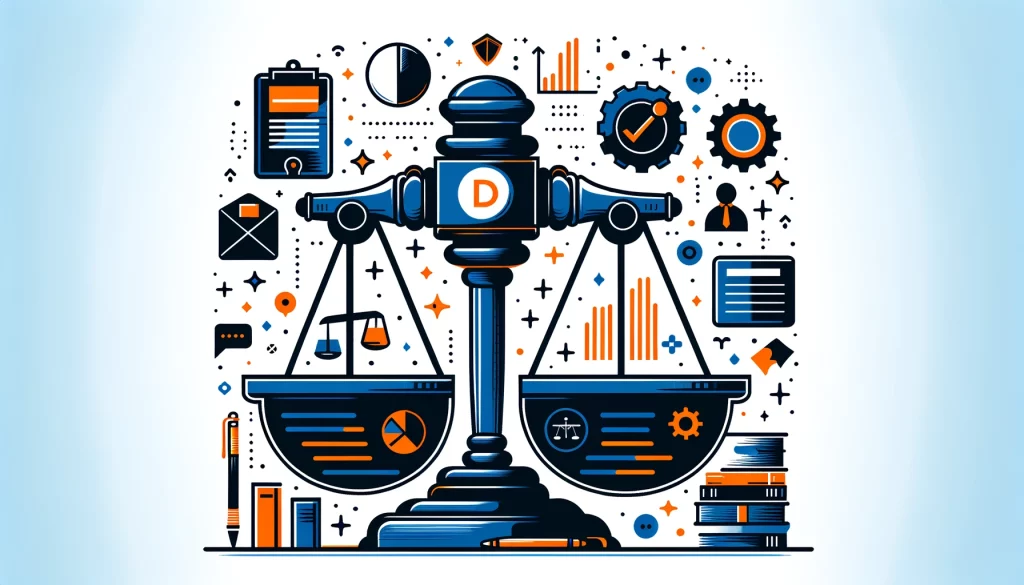
Data Governance

Data is the lifeblood of modern organizations. It enables companies to gain a competitive edge in their respective industries. Managing data effectively requires a robust framework that ensures data quality, security, and compliance. Data governance solves these issues.
What is Data Governance?
Data governance is a set of policies, procedures, and practices that govern how an organization manages its data.
It encompasses everything from data quality and security to data ownership and access control. The primary goal is to ensure that data is accurate, reliable, and secure throughout its lifecycle.
Effective governance is crucial for organizations that rely heavily on information to make critical business decisions.
Businesses can get more value from their data assets by reducing the risk of data breaches. They can also ensure compliance with regulations. This allows organizations to use their data effectively.
The Importance of Data Governance in the Cloud Era
In a cloud-centric world, governance has become more complex than ever before. Managing data on different cloud platforms and on-premises systems can be difficult. This involves making sure that the data is consistent, secure, and compliant with regulations.
It can be a challenge to maintain data integrity and security across multiple platforms. Compliance with regulations is also a key aspect of managing data effectively.
Cloud governance is the practice of managing data availability, usability, integrity, and security in cloud computing systems.
It involves implementing policies and procedures to ensure data protection, security, and compliance across all cloud platforms.
Effective cloud governance enables organizations to:
- Enhance data privacy and security
- Control and monitor access to sensitive data
- Leverage real-time data analytics to improve operations and decision-making
- Ensure ongoing compliance with data privacy and security regulations
- Mitigate the risk of data breaches and other security threats
The Benefits of Effective Data Governance
Implementing a robust governance framework can yield significant benefits for organizations of all sizes. Some of the key benefits include:
Improved Data Quality
Governance ensures that resources are accurate, complete, and consistent across all systems and applications. This helps reduce the chances of mistakes. These errors could result in poor decision-making and negatively impact business outcomes.
Enhanced Data Security
Data governance policies and procedures help to protect sensitive data from unauthorized access, theft, and misuse. This is particularly important in today’s threat landscape, where data breaches and cyber attacks are becoming increasingly common.
Increased Regulatory Compliance
Many industries are subject to strict data privacy and security regulations, such as GDPR, HIPAA, and PCI DSS.
Implementing strong governance practices can help organizations comply with regulations. This reduces the risk of costly fines and protects their reputation.
Better Decision-Making
When data is accurate, reliable, and easily accessible, organizations can make better-informed decisions that drive business value.
Data governance makes sure that decision-makers can access the right data at the right time. This helps them make decisions that improve business outcomes.
Reduced Costs
Effective governance can help organizations to reduce costs associated with management and storage.
Companies can save money by creating rules and steps to organize and save data properly. This helps them avoid the cost of storing and managing unnecessary data.
The Five Principles of Effective Data Governance
To implement an effective framework, organizations should adhere to five key principles:
Accountability
Data governance requires a high level of accountability across the organization. This means that everyone, from top leaders to data caretakers, must ensure that they handle and safeguard data properly.
Standardization
The organization must standardize governance policies and procedures to ensure consistency and compliance. This includes developing and enforcing uniform rules and regulations for data usage, storage, and protection.
Data Stewardship
Effective governance requires dedicated stewards who are responsible for overseeing management and ensuring compliance with policies and procedures.
Data Quality
Data quality is a critical component of effective data governance. Companies must create rules for their data. They should also regularly check the data to ensure it is accurate, complete, and consistent. This ensures that the data stays reliable and can optimize decision-making.
Regular reviews also help identify any errors in the data that need prompt addressing. By maintaining high data quality standards, organizations can improve the overall efficiency and effectiveness of their operations.
Transparency
Data governance processes should be transparent and well-documented. This ensures that everyone knows what they need to do and can be responsible for what they do.
The Key Components of a Data Governance Framework
A comprehensive data governance framework should include several key components, including:
People
People are one of the essential data governance components. Governance requires a dedicated team of professionals, including data stewards, data analysts, and IT staff. These individuals are responsible for developing and implementing governance policies and procedures and ensuring ongoing compliance.
Processes
Processes are another crucial aspect of data governance components. Data governance processes should be well-defined and documented. This includes processes for data quality management, data security, data access control, and data lifecycle management.
Technology
Effective governance requires the right technology tools and platforms. This may include data management software, data quality tools, data security solutions, and data analytics platforms.
Metrics
Organizations should establish key performance indicators (KPIs) and metrics to measure the effectiveness of their governance programs. This helps to identify areas for improvement and ensure ongoing success.
Implementing a Data Governance Program
Implementing a governance program can be a complex and challenging undertaking. However, by following a structured approach, organizations can ensure a successful implementation.
Step 1: Define Data Governance Goals and Objectives
The first step in implementing a data governance program is to define clear goals and objectives. This may include improving data quality, enhancing data security, ensuring regulatory compliance, or driving business value through decision-making.
Step 2: Identify Data Owners and Stakeholders
Next, organizations should identify data owners and stakeholders across the organization. This includes individuals who create, modify, or use data, as well as those responsible for data management and protection.
Step 3: Develop Data Governance Policies and Procedures
Once organizations identify data owners and stakeholders, they can begin developing data governance policies and procedures. This may include policies for data quality management, data security, data access control, and data lifecycle management.
Step 4: Implement Data Governance Technology Solutions
To support data governance policies and procedures, organizations should implement the right technology solutions. This may include data management software, data quality tools, data security solutions, and data analytics platforms.
Step 5: Train and Educate Stakeholders
Effective governance requires buy-in and participation from all stakeholders.
Organizations should provide training and education to ensure that everyone understands their roles and responsibilities and can effectively participate in the data governance program.
Step 6: Monitor and Measure Success
Finally, organizations should establish KPIs and metrics to monitor and measure the success of their data governance program. This helps to identify areas for improvement and ensure ongoing success.
Data Governance in Healthcare: A Critical Imperative
In healthcare, strong data governance is essential. It ensures that we always protect and secure sensitive patient information. Healthcare organizations face a unique set of challenges regarding governance, including:
- Ensuring compliance with strict data privacy and security regulations, such as HIPAA
- Managing large volumes of complex and diverse data, including electronic health records, medical images, and clinical trial data
- Ensuring data quality and consistency across multiple systems and applications
- Enabling secure data sharing and collaboration among healthcare providers, researchers, and other stakeholders
To address these challenges, healthcare organizations must implement robust governance frameworks that ensure resource quality, security, and compliance.
This could mean implementing measures to protect data, such as encryption and access control. It could also involve establishing guidelines for data quality and creating procedures for managing and sharing data.
The Role of Data Governance in Driving Business Value
Many organizations view data governance as a necessary task to comply with regulations and reduce risks. It can also help businesses succeed. However, it can also serve as a valuable tool for driving business value.
Data governance helps organizations make better decisions by making sure data is correct, trustworthy, and easy to find. This can help improve how well a company runs, come up with new ideas, and make customers happier.
A retail company with good governance can use customer info to improve personalized marketing. They can also use it to manage inventory effectively. Additionally, they can make supply chain operations more efficient.
This means they can create targeted marketing campaigns based on customer preferences. They can also keep track of inventory levels more efficiently. In addition, they can improve the effectiveness of their supply chain operations.
A healthcare group that ensures patient information is accurate and consistent can improve patient outcomes. This can lead to fewer hospital visits and lower healthcare costs.
Data governance involves more than just rule-following and risk management. It also focuses on maximizing the value of data. By investing in data governance, organizations can gain a competitive edge nowadays.
The Future of Data Governance
As data keeps growing in size, speed, and variety, the need for good data governance will also grow. In the years ahead, we can expect to see several key trends in it, including:
- The increasing use of artificial intelligence and machine learning to automate governance processes and improve quality and security.
- The growing importance of data ethics and responsible data management, particularly as organizations collect and use more sensitive personal data.
- New frameworks and standards. These include the Data Governance Maturity Model and the Data Management Body of Knowledge (DMBOK). These frameworks and standards are exciting and innovative. These frameworks and standards are emerging in the field.
- The increasing focus on overnance as a strategic business imperative, rather than just an IT or compliance function.
Conclusion
Governance is a critical imperative for organizations of all sizes and industries. It ensures data accuracy, safety, and compliance with rules. It also assists organizations in leveraging their data to generate business value.
A good data organization system can help companies keep their information safe, follow rules, and make better decisions. This system should include the right rules, steps, and technology. Helping the business succeed will be beneficial.
By investing in data governance today, organizations can position themselves for success in the future.
